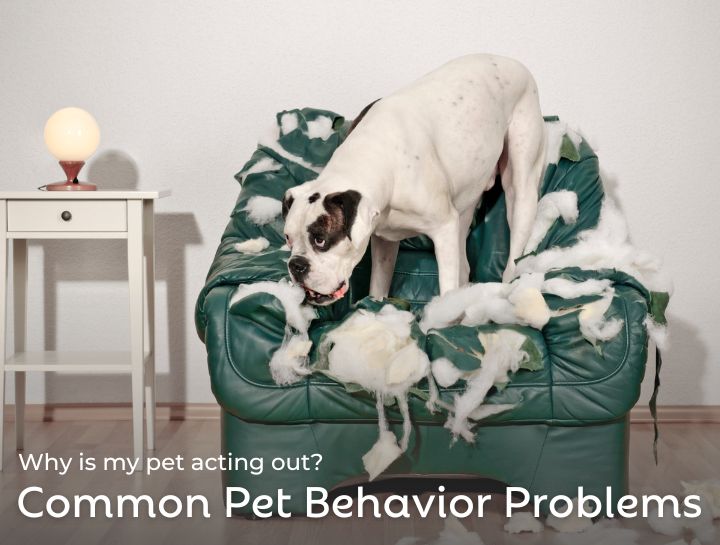Why Is My Pet Acting Out? Common Behavior Problems

We all adore the companionship and unconditional love our pets bring into our lives. But sometimes, that bond can feel a little strained when our companions start exhibiting behaviors that leave us scratching our heads – or feeling a bit frustrated.
Just like us, our pets communicate in various ways, and sometimes, what we perceive as "acting out" is their way of telling us something important. If your dog is suddenly chewing furniture, your cat starts missing the litter box, or your usually sweet rabbit is becoming nippy, there may be underlying causes. Let's explore common reasons why your cherished pet might be having behavior issues and what you can do to help.
Decoding Dog Behavior
-
Destructive chewing in puppies is often due to teething, but in adult dogs, it can signal dog boredom or dog anxiety. Provide engaging chew toys and address underlying anxiety with training and environmental enrichment.
-
Excessive barking can indicate territoriality, attention-seeking, boredom, anxiety, or even a medical issue. Identify the trigger to find solutions like training or environmental management.
-
House soiling in previously trained dogs may point to medical problems or stress. Consistent training and positive reinforcement are crucial.
-
Dog aggression, including growling, can stem from fear, territoriality, or pain and requires professional help from a trainer or veterinary behaviorist.
-
Separation anxiety can manifest as destructive behavior or inappropriate elimination when alone; create a safe environment and consider desensitization.
-
Destructive digging may be due to breed instinct, boredom, or a desire to escape; provide outlets for their energy to curb this unwanted behavior.
Deciphering Cat Behavior
-
Inappropriate scratching is a natural cat behavior for claw maintenance and marking, but you can redirect it by providing appealing scratching posts that make furniture less attractive to scratch.
-
Eliminating outside the litter box is a common concern that often indicates a medical issue such as cystitis, diabetes, or kidney problem, which requires a vet visit. Stress or litter box aversion can also be contributing factors.
-
Feline aggression, including biting and swatting, can arise from fear, overstimulation, territorialism, or pain. Understanding your cat's body language and providing outlets for play can help.
-
Excessive meowing can be attention-seeking, a sign of hunger, a symptom of medical conditions like hyperthyroidism, or even cognitive decline in older cats. A veterinary exam is essential to rule out medical causes.
A Peek into Pocket Pets and Exotics
-
Pocket Pets: Destructive chewing, inappropriate litter box habits, nipping or biting, destructive digging, and aggression can be signs that something isn’t quite right.
-
Birds: Excessive screaming, feather plucking, and biting can be signs of anxiety or medical issues.
-
Reptiles: Stress-related behaviors like excessive hiding or refusing to eat may be signs your pet is trying to communicate with you.
The Root of the Problem: Why the Change in Behavior?
Understanding the "why" behind your pet's behavior is crucial for finding effective solutions. Common underlying causes include:
-
Medical Issues: Just like us, when our pets aren't feeling well, it can manifest in behavioral changes. A vet visit is essential to rule out any underlying medical conditions. Pain, infections, hormonal imbalances, and cognitive decline in older pets can all contribute to behavioral changes.
-
The Environment Matters: Is your pet's environment stimulating and appropriate for their species? Lack of enrichment, inadequate space, loud noises, or changes in their routine can all trigger stress and lead to behavioral issues.
-
Lack of Training and Socialization: Early and ongoing positive reinforcement training is vital for dogs to learn acceptable behaviors. Proper socialization during their formative months helps them develop into well-adjusted companions. While training looks different for other species, understanding their natural behaviors and providing the right outlets is key.
-
Stress and Anxiety: Changes in the household (new pets or people), moving, loud noises, or other fear-inducing situations can cause significant stress and anxiety in our pets, leading to various behavioral problems.
-
Nutritional Considerations: While less common, extreme dietary deficiencies or sensitivities could potentially affect behavior.
-
Aging and Cognitive Decline: As our pets age, they may experience cognitive decline, which can lead to confusion, disorientation, and changes in behavior.
Finding Harmony Again: What You Can Do
Understand that sudden changes in pet behavior can often be addressed with patience and the right strategies. A crucial first step is a veterinary check-up to rule out underlying pet medical problems. Effective tools for addressing pet behavior issues include positive enrichment, reward-based pet training, establishing consistency and routine for pets, desensitization techniques, and seeking guidance from professional pet behaviorists or certified pet trainers. Remember, your pet's behavior is communication, not disobedience. Approaching these challenges with patience and empathy will ultimately strengthen your pet bond and facilitate finding effective solutions for common pet behavior problems.
If you're concerned about behavioral changes in your pet, please don't hesitate to contact us. Call us at (609) 298-3888 to discuss your concerns and schedule an appointment.
